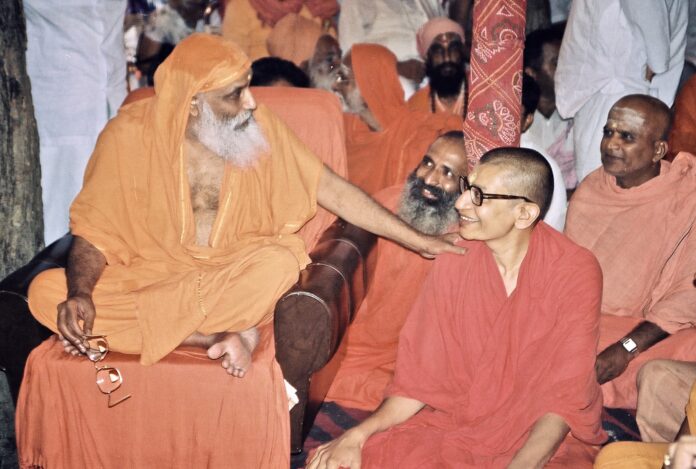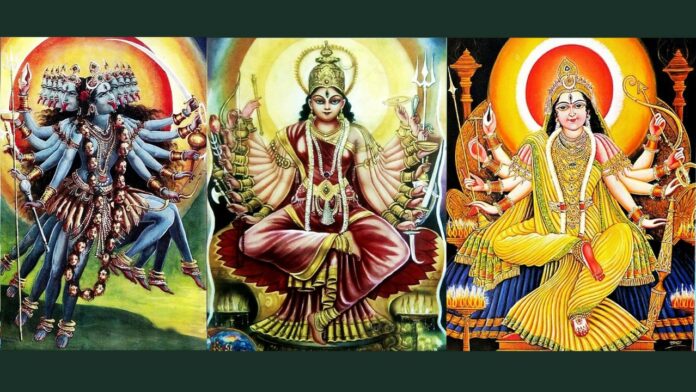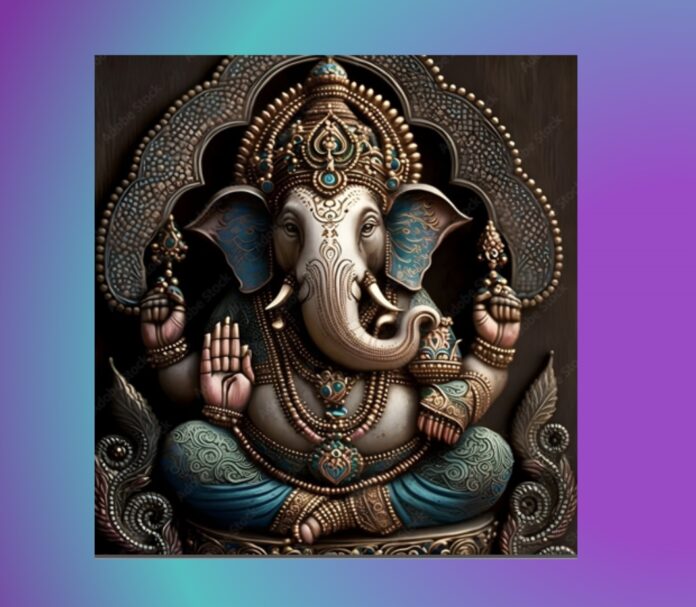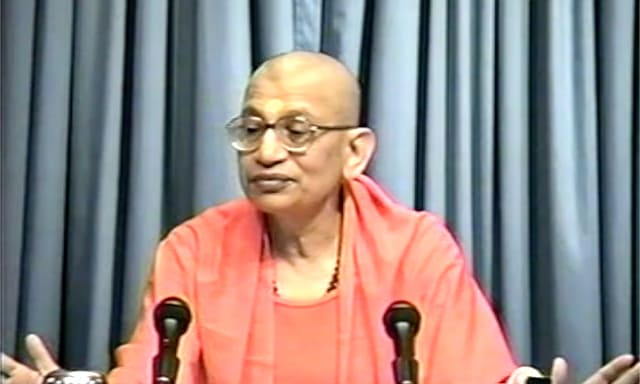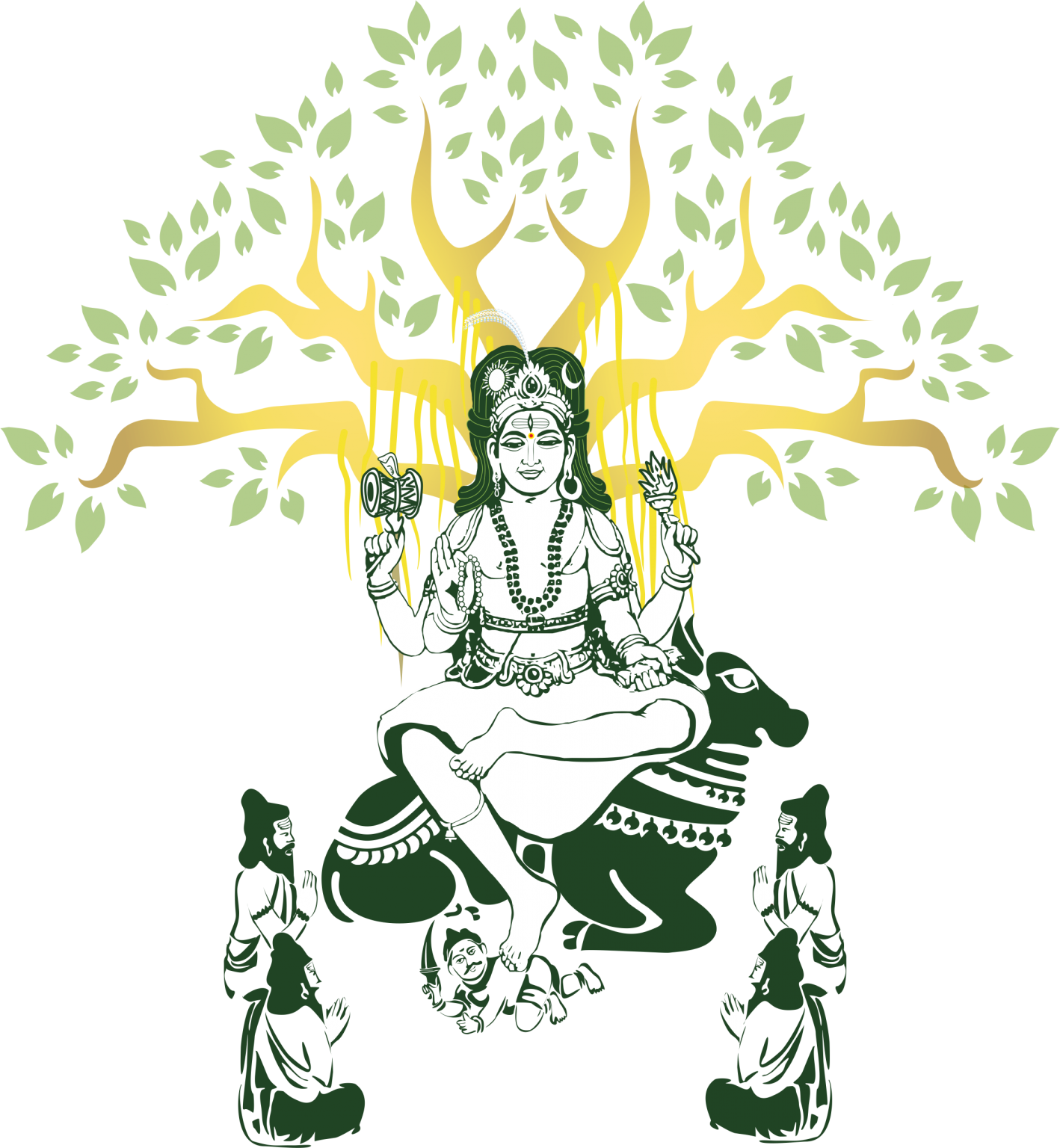Satsanga with Sri Swami Viditatmananda Saraswati
2005 Arsha Vidya Gurukulam Family Camp satsanga. Transcribed and edited by Jaya Kannan, Chaya Rajaram and Jayshree Ramakrishnan.
Question:
What is the purpose of creation? What is our role in it?
Answer:
Creation, as we understand it, is a cyclic phenomenon. It did not have a beginning in the sense that it did not come into being at any particular point in time. A beginning is a coming into existence of something that did not exist earlier. There was never a time that the creation was not; it has always been.
Only, it is a cyclic phenomenon of creation, sustenance, and dissolution, from being manifest to becoming unmanifest and then manifesting again. This is like a seed becoming the tree that produces the seed that again becomes a tree, or like water rising to become the cloud that comes down as the rainwater that again rises to become a cloud, and so on. Similarly, this creation is also a perpetual cyclic phenomenon.
The purpose of creation as in ‘why’ can be asked only provided there is a beginning. Something that has a beginning is an effect and so there can be a cause. Thus, if there were a cause you could ask ‘why’. There is no cause for the creation as such because it has no beginning and so one cannot question why it exists; we can only inquire into the purpose of a given cycle of creation. We can imagine countless cycles of creation. A cycle of creation from manifestation to sustenance to dissolution takes place over billions and trillions of years. That is the span of a cycle of creation. Why is the creation there at all? There is no answer to that. Yet we can ask what caused the very first cycle of creation as in what caused the unmanifest to manifest.
The cause for the primary cycle of creation can be understood through the example of the cycle of sleep and waking. When we go to sleep, we are in a state of being unmanifest or in a causal state. When we wake up there is a state of manifestation. Sleep surfaces into wakefulness, which goes back into sleep that again emerges into wakefulness, and so on. This is the cycle of one’s being manifest to one’s becoming unmanifest and then, from being unmanifest, to becoming manifest again. You can ask what it is that makes you wake up from the state of sleep. “Is there something because of which I wake up?” The answer is yes. When you are in the state of deep sleep, whatever unfulfilled desires you have lie dormant within you; it is those desires, which, when ready to express themselves, wake you up. This is the reason you wake up and it is this that makes the creation what it is.
Why is the creation how it is?
The answer is that it is the result of the total desires of all the living beings; they were all ‘sleeping’ in a state of dissolution and then they all needed to wake up to fulfill their desires. Therefore, the creation is as it is in response to the desires of all the living beings. There is an appropriate field for the expression of the desire of every living being in this creation. Whatever be the basic needs of all the creatures, including the human being, there is a provision for the fulfillment of all those needs. The purpose of creation, therefore, is to provide all the living beings with an appropriate field so that they can fulfill their desires. It therefore exists in response to the need of all the living beings. That is how we can understand the purpose of creation.
What is our role in this creation? Well, as human beings, we are born with an agenda. Our birth is no accident. It does have a purpose. Other than the human being, as far as the other creatures are concerned, the purpose of birth seems to be to simply fulfill the basic instincts of eating, drinking, self- preservation, and self-propagation. That seems to be the purpose of their lives.
But the human being is born with a desire to attain freedom. I cannot accept the bondage; I want freedom. And, therefore, the human being is born with an agenda. Our role would then be to live a life, which is compatible with fulfilling our desires. If freedom or mokṃa is the desire, then our lives should be compatible with the fulfillment of that desire. When can we gain mokṃa? That will happen when we gain self-knowledge. When will we gain the knowledge? When we have what we call ‘antaḥkaraāa śuddhi’ or purity of mind. Therefore, our lives should become a process of a progressive purification of the mind.
What is meant by purification?
In having a pure mind, we become free of self- centeredness; we become other-centered. That is a role; our role is to become contributors to the scheme of things. We are the recipients of the contributions of others and it is only right that we should also make our own contribution to this scheme of things. The spirit of contribution is conducive to the growth that is required for achieving our ultimate goal of freedom. We can thus look upon this as being our role.
Question
How do you find the agenda or purpose of life? Is living life as a householder and raising children the agenda?
Answer
Doing your job and raising your children are only a means to an agenda; they are themselves not the agenda. One’s agenda in life can simply be emotional maturity. We are born with an innate desire to be happy and free. When can you experience this happiness and freedom? It can happen only when you are emotionally mature. Therefore, emotional maturity becomes an agenda in itself. Then what do we do with our lives? You may ask what you could do towards this. You continue to live your lives, whichever stage of life you may be at. All the things you do, such as your work or raising children, should be done in such a way that they bring about emotional maturity. These are very demanding things. You fulfill all those desires properly to bring about emotional maturity. It is different if you cop out or take short cuts, but if you sincerely fulfill the demands that are made upon you, whether in your work or in relating to your family, your friends, or the community, life will become a process of achieving emotional maturity. Whatever you do must be done in keeping with dharma so that your very life will become a means to emotional maturity.
We must learn how relating to each other requires us to drop and let go of things. As much as possible, I must let go of my demands, my rights, and my ego in order to nourish and nurture the relationship. The most important thing in any relationship is our ability to nurture that relationship. After all, most of our happiness comes from relationships. Pizza and ice cream might contribute a little bit to it, but as emotional beings, our real happiness or joy comes from relationships. By relationships, I mean all kinds of relationships whether between a husband and wife, or between parents and children, between siblings, friends, or in the workplace. Each one of these relationships can be a source of great happiness just as much as each one of them can also be a problem. That’s why every relationship is important.
A friendship is a very precious relationship. It is a great blessing to have a good friend and, however many you may have, you must nourish each friendship. Just as a young plant needs you to constantly take care of it, so also, every relationship requires a commitment on your part not to take it for granted. We cannot take any relationship for granted. Nothing can be taken for granted. Each relationship requires nurturing and nourishing. It requires an investment on one’s part. In turn, the relationship is a source of great joy. Every relationship can, therefore, become a means to grow in emotional maturity.
Every relationship has its own demands. The relationship between a husband and wife may be one of the most demanding relationships. Even the relationship of the teacher and student between us in which I am speaking and you are listening needs to be maintained, nurtured, and nourished. Therefore, each one has to play the role of being related to another, properly.
We are constantly relating to the world. That is the nature of our lives. Our minds are ceaselessly thinking about something or someone. Our interaction with the world is also a relationship. We are social beings and relationships are the most important and valuable thing that we have. You should know that. This demands that we value them and treat them with commitment and wisdom. Therefore, even as you live the life of a householder, it is a means to grow in emotional maturity. Guard against your ego coming in the way of your relationships. Remember that the ego is not a source of happiness, but a burden. If the relationship requires that you drop the ego, then that is good. Why don’t you drop it? When we understand this, we will be ready to let go.
